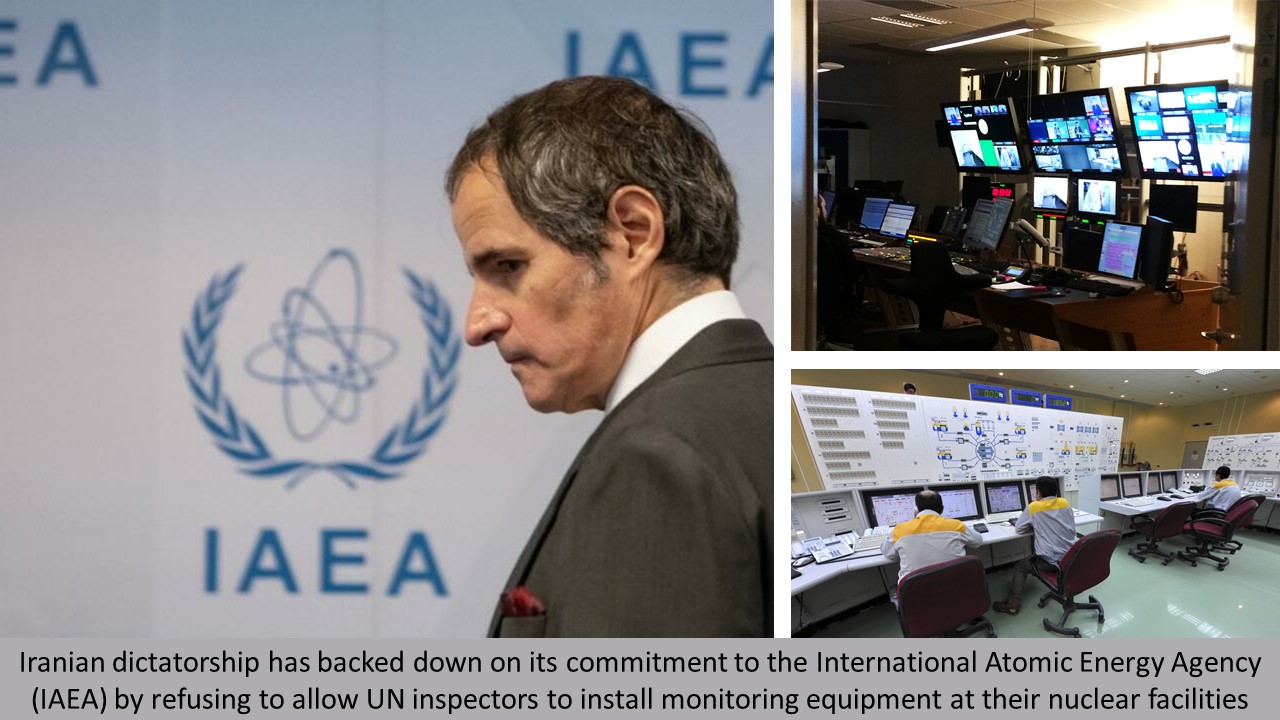
(PMOI / MEK Iran) and (NCRI): Iran Backtracks on Nuclear Commitments Following IAEA Agreement.
The National Council of Resistance of Iran (NCRI), and the People’s Mujahedin of Iran (PMOI / MEK Iran), reported that despite agreeing to the request two weeks ago, the Iranian dictatorship has backed down on its commitment to the International Atomic Energy Agency (IAEA) by refusing to allow UN inspectors to install monitoring equipment at their nuclear facilities.
The regime’s decision to restrict UN inspectors
The regime’s decision to restrict UN inspectors from the TESA Karaj centrifuge component manufacturing facility, according to IAEA Director-General Rafael Grossi, is “contrary to the agreed terms of the joint statement issued in September.”
In mid-September, Grossi traveled to Tehran and struck an agreement with the Iranian regime to resume the long-overdue servicing of its nuclear-related equipment. The accord was intended to defuse tensions with the international community ahead of the IAEA Board of Governors meeting and pave the way for the resumption of talks over Iran’s nuclear program.
In order to conceal their nuclear activities, the regime has continued to deceive the IAEA at every opportunity. They have refused to respond to inquiries regarding uranium traces discovered at three undeclared facilities, and they have refused to comply with the 2015 nuclear deal commitment to diminish its highly enriched uranium stockpile.
This is simply the latest in a string of recent occurrences demonstrating the Iranian regime’s refusal to resolve nuclear-related issues.
The regime’s growing stockpile of highly enriched uranium
The IAEA issued a report earlier this month stressing the international community about the regime’s growing stockpile of highly enriched uranium and their lack of cooperation in maintaining monitoring equipment at their nuclear facilities.
Grossi indicated in an August report that the inspectors he sent to Tehran confirmed that the regime had manufactured 200 kilos of 20% enriched uranium metal at the time. He had warned two months earlier, during a meeting of the IAEA board of governors, that the regime’s refusal to answer their queries jeopardizes the IAEA’s capacity to provide assurance of Iran’s nuclear program’s peaceful nature.
Inspectors from the International Atomic Energy Agency confirmed in February that the regime had generated 3.6 grams of uranium metal at the Isfahan nuclear reactor. The regime asserts that high-enriched uranium is required for civilian uses.
European signatories have expressed alarm
European signatories to the 2015 nuclear deal, officially known as the Joint Comprehensive Plan of Action (JCPOA), have expressed alarm about Iran’s uranium output and acknowledged that the country does not require it for civilian purposes. Rather, it’s a “critical step in the development of a nuclear weapon.”
Ebrahim Raisi, the regime’s new president, underlined in a recent speech to the United Nations General Assembly that his regime would not comply with the JCPOA unless all sanctions were withdrawn. He made no mention of his regime’s deadly high-enriched uranium stockpile.
The reality is that the Iranian regime has been misleading the world by concealing its nuclear program, and the international community’s sole means of putting a stop to it is to offer concessions or display complacency.
The Iranian people will reject any accord that does not completely shut down the regime’s bomb-making, enrichment, and nuclear facilities.
MEK Iran (follow us on Twitter and Facebook)
and follow Maryam Rajavi’s on her site 
and follow NCRI (Twitter & Facebook) and People’s Mojahedin Organization of Iran – MEK IRAN – YouTube
